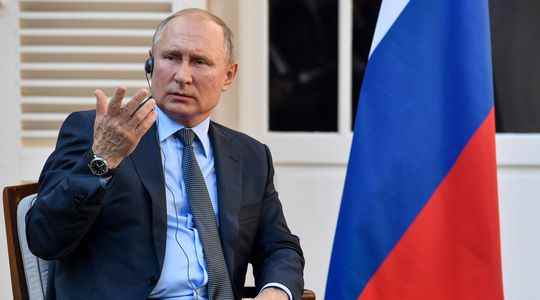The sentence fell like a cleaver: “I order the Minister of Defense and the Chief of Staff to put the Russian army’s deterrent forces on a special combat alert regime”, he told the Russian television Vladimir Putin, Sunday February 27. Apart from strategic bombers, submarines and missiles, there are also nuclear weapons in this arsenal. The reactions were quick. “Unacceptable” for Washington, “irresponsible” for NATO. Should we take this announcement seriously? The decryption of Benjamin Hautecouverture, researcher at the Foundation for Strategic Research, nuclear specialist.
L’Express: How should this statement by Vladimir Putin be interpreted?
Benjamin Hautecoverage: When we talk about threat, what are we talking about? From the combination of a will and a capacity. Does Russia have the capability, i.e. a credible nuclear deterrent? Yes. The Russians have a “strategic triad”, which includes land, sea and air components, which have been considerably modernized since the beginning of the 2000s, with, in particular, three quarters of their land launchers upgraded to this day. They have gradual strike options, i.e. low, medium and high power. Their dissuasive tool is based on a doctrinal corpus and strategic documents.
One could of course imagine that the Russian president wants to use a low-powered weapon as a warning. In the early 2010s, there was talk in Moscow of an “escalation for de-escalation” doctrine [NDLR : qui consiste à abaisser le seuil d’utilisation d’une arme nucléaire pour mettre fin à un conflit]. But this doctrinal option does not appear in the official documents and nothing says that such a scenario, which would be one of the worst-case scenarios, is envisaged by the Russian president, nor shared by his staff.
At this stage, however, no one can exclude that he “presses the button”…
President Putin cannot “push the red button” in a moment of Doctor Strangelove madness. Fortunately, nuclear power does not work like that, even in Russia. The encrypted communication device intended to order the launch of a nuclear strike works in coordination with the Minister of Defense and the Chief of the Defense Staff. It is the combined action of these three people that can trigger the nuclear fire. Let us also remember that despite everything that has been written, the semi-automatic system called “Dead hand”, which would have been designed under the USSR to respond without delay to an American nuclear strike, does not exist.
Except that the Minister of Defense, Sergei Shoigu, is not known for his moderation. It’s hard to imagine that he would oppose the president…
All scenarios are possible, and that of the use, even limited, of nuclear weapons, is the worst, but it is the least probable. Vladimir Poutine evokes the increase of the state of alert of the force of deterrence, it does not evoke a threat of employment, it is very different. He had already mentioned the possibility of raising the alert stage in 2015 in a documentary on the annexation of Crimea, broadcast by a Russian public television channel. In this film, which returned to this military operation, the Russian president affirmed that he would have, at the time, “increased the state of alert” if the events had taken an “unfavorable turn”.
However, what has Putin seen for the past few days, if not the extremely strong response from Westerners? This is, moreover, completely unprecedented in the history of the NATO and European Union countries, whether it concerns the German response – spectacular – or the mobilization capacity of the Ukrainians. Seeing this, Putin certainly thinks that the military campaign in Ukraine could well show signs of getting bogged down and end in an asymmetrical conflict that the great powers systematically lose. To prevent events from taking an “unfavorable turn”, Putin had better win decisive victories quickly before re-engaging in talks. In deciding to increase the level of nuclear pressure, he is probably showing an impatience with operational realities that disappoint him. If this hypothesis is correct, then the diagram remains rational, even if it reveals great restlessness on his part. However, there remains a more worrying scenario.
Which ?
I have just reread the Russian nuclear doctrine which was revised in 2020. Among the reasons which would justify the use of nuclear weapons is the case where “the very survival of the State would be in danger”. A priori, we are not in this case. Nothing today threatens the survival of the Russian state… unless Putin considers that “the state is him”. And what could threaten his regime, and therefore be indebted to nuclear deterrence, if not a military defeat against a Ukraine armed by NATO countries? This would be worrying, because he could make this argument, in particular to the Minister of Defense and his chief of staff. In this case, the conflict – today of a conventional nature – would risk approaching the nuclear threshold.
